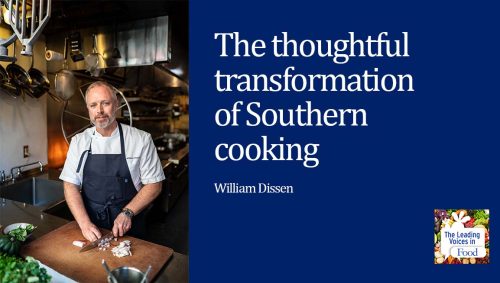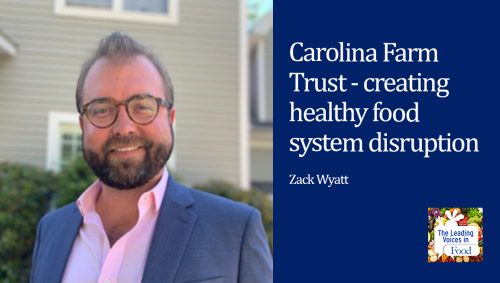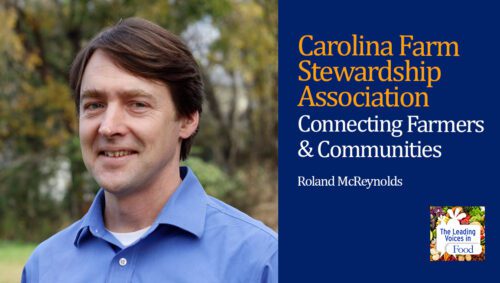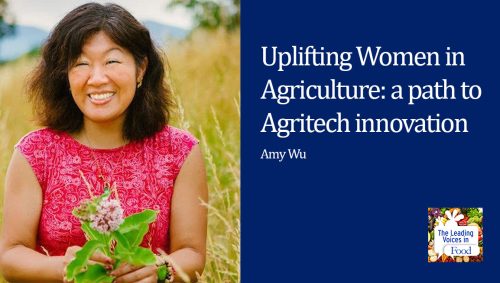The Leading Voices in Food
E60: A Visit to Middlecreek Farms in the Blacklands of North Carolina
Driving along the North Carolina coastline protected by the Outer Banks barrier islands, I pass swamps, canals and fields. I’m visiting an agricultural region called the Blacklands. The soil is black and fertile and the Blacklands range across eight counties. I’m visiting Middlecreek Farms, a family operation in Engelhard, North Carolina, now run by Dawson and Bethany Pugh. The day’s plan to begin harvesting corn has been scrapped in the aftermath of a heavy rain and the farm crew works in the shop making repairs and doing equipment maintenance.
Subscribe: Apple Podcasts | TuneIN | YouTube Music | SoundCloud | PocketCasts | Radio Public
Tags: Agriculture & Tech | Climate Change, Environment & Food | North Carolina | Voice of Farming |

Middlecreek Farms is a fourth-generation family operation in Engelhard, North Carolina, now run by Dawson and Bethany Pugh.
Interview Summary
Welcome to the Leading Voices in Food podcast, an educational series produced by the World Food Policy Center at Duke University. I’m Deborah Hill. You’re listening to a segment in our voice of farming series.
Driving along the North Carolina coastline protected by the Outer Banks barrier islands, I pass swamps, canals and fields. I’m visiting an agricultural region called the Blacklands. Originally a cypress tree swamp, this area is rich in organic matter. Blackland farmers grow corn, soybeans and wheat, potatoes, and a wide range of vegetables from onions to cucumbers to green beans. The soil is black and fertile and the blacklands range across eight counties including Beaufort, Washington, Hyde, Tyrrell, Dare, Pasquotank, Carteret, and Pamlico counties.
I’m visiting Middlecreek Farms, a family operation in Engelhard, North Carolina, now run by Dawson and Bethany Pugh. The day’s plan to begin harvesting corn has been scrapped in the aftermath of a heavy rain and the farm crew works in the shop making repairs and doing equipment maintenance.
I’m Dawson Pugh from Engelhard, North Carolina. My wife Bethany and I have four kids and we own and operate Middlecreek Farms. It’s a family farm that is a fourth generation farm. I grew up here on the farm and that’s all I’ve ever wanted to do. I mean, if you, if anybody ever asked me what I wanted to do, I wanted to farm and was able to come back to the farm in 1997 and I worked with my dad until 2003 and he decided that after the hurricanes in 2003 that he wanted to get out of it. So he told me that he would sell me the equipment and rent me the land, but he didn’t want to farm anymore. So, then 2004 we, Bethany and I were able to start farming on our own, which was not how we thought that we would end up farming. We knew that, already hoped that one day we could take care of the farm, but I had no idea that my daddy would want to retire it so early.
We’re truly a family farm. Also, we have our office located on the property. It’s an old farm house that we converted into our office. Along with the desk and a computer, you’ll find a lot of toy tractors and a baby bed because our kids are here just about as much as they are at home. And I enjoy for them to come. I’m glad that they get to come and be here, too.
Bethany is mom number one. But she takes care of all the bookkeeping, all the payroll, FSA, she’s the office manager. She keeps us all going. Without her, we wouldn’t be able to work.
Farms in the Blacklands are still mostly family owned and range anywhere from 20 to 10,000 acres. Here as with many family farms, succession from generation to generation is an ongoing challenge. When young people choose not to go into farming and leave the area, older generations face difficult decisions.
When I started, when Bethany and I took over the farm from Mom and Daddy, we were farming about 2,500 acres and we didn’t really say, “Hey, we want to farm 4,000 acres.” We just, it just kind of happened because we’d have neighbors that would decide that they were going to quit farming or, and they just come to us and say, “Would you like to farm our land?” And that’s just kind of how it worked and kind of felt good about that.
When I was a boy, there was a lot of farms, right, farmers. And their kids grew up and decided that they didn’t want to come back to the farm. And then when they got to age they were to retire or they had to get out of farming, they just, there wasn’t anybody there to take their place. Kind of sad. There’s fewer and fewer farmers and I don’t, I mean I feel lucky that my family farm, I love to farm. I’m certainly thankful for the decisions that my dad made, his granddaddy made. And if it hadn’t been for those decisions, we wouldn’t be able to do this. I’m farming and I bought the farm from him. But that’s an opportunity that I was given. I mean, I certainly didn’t do it. I mean, we might’ve come up with the money to buy the equipment, but like I said, the decisions, the good decisions that they made, maybe some of the bad decisions they made, we all learn from those. That’s why we’re farming.
I don’t remember not working on the farm. I mean, I was here, I guess. I don’t know when I actually started working. I know I, when I was 12 years old, I harvested the wheat crop. That was a big thing. I did it, the first day or two he would go and help me. They would move it up and down the road for me, but he would go help me open up a field and then he would get off and I’d harvest it. So I guess I started running the combine when I was 12 and I still love to run a combine. So I don’t see myself working until I’m 75 years old. Maybe having a baby that’s a year and a half or a kid that’s a year and a half might have extended that a little bit longer.
But I would love to be able to, if they want to come, if my kids want to come back and farm, I’d love to be able to get them going and everybody feels comfortable. They feel comfortable. I feel comfortable. I don’t want to step away from it completely. I don’t just want to sell out, but I don’t want to own it and be the boss until they’re 50 years old either.
I can go do what we want to do and then if it’s busy time of the year and he needs some help, I’ll be right here. And my daddy just because he sold his equipment and everything to me it didn’t mean that he got out of it. He was right there if I needed help, he was there to help me. And he, we get along really good so he if sees I’m doing something way wrong, he won’t mind telling me, but if I have a question or if I have something that I need to ask somebody, he’s the first person I go to.
Grain facility and we’re getting ready to start one of the grain dryers up to dry some corn that we’ve been harvesting. We grow corn, soybeans, both of those for, corn for grain used for animal feed here in the state and soybeans used some for seed but most for soybean meal for the animals, livestock industry. And we grow fresh market red potatoes, red and yellow potatoes that are, that we bag and we’re a partner in Pamlico Shores is the name of our business that we do potatoes and we pack those potatoes that go straight to grocery stores or sell to food service. We grow Madam Mesquite sweet onion. We don’t grow many acres but we sell pretty much to, we don’t do any commercial selling. We sell by the bag and we also grow fresh market and processing green beans.
Like any business, farms adapt and change over time to stay competitive. For Middlecreek Farms, this means working hard to retain a skilled and experienced work staff.
It takes good crew to do it. And we have a really good group of guys that help us and that means a lot. I mean, we wouldn’t be able to do the things we do without the awesome crew that we have. Ruben Murray, he’s been with, he started working with my daddy when I was 16 so he’s been here 26 years. And then three of our employees, they’ve been here for 10 to 15 years. And I want them to stay and we try to do things to keep good employees. I mean, we’ve started offering health insurance, 401k because we’ve got to compete with the other jobs. There’s not a lot of jobs in Hyde County, but, so we’ve got to be competitive with those jobs. We’ve decided that we needed to offer some kind of benefit package to be able to keep good employees.
When you started thinking about it and what it cost, it costs a lot of money to do it. But it costs a lot of money when you have good employees and then you lose them and then you got to try to find somebody else and they’re not as good as. They’ll learn, but it takes a lot of training and Bethany really took care of figuring all that out. But I guess the biggest hurdle that you got to think about is you got to think about, that you got to get over, is the expense of it and start thinking about the investment into the people. I said it costs a lot, but you’re investing in good people that are going to stay with you. I mean, that means a lot.








